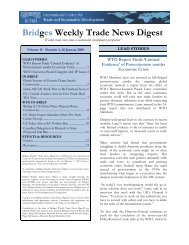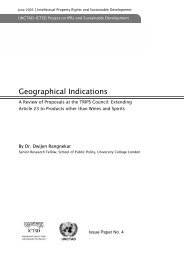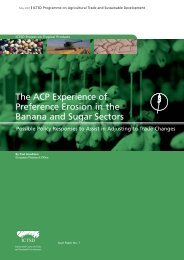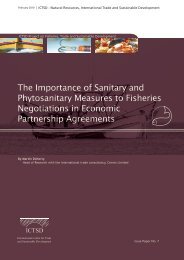Intellectual Property and Competition Law - IPRsonline.org
Intellectual Property and Competition Law - IPRsonline.org
Intellectual Property and Competition Law - IPRsonline.org
You also want an ePaper? Increase the reach of your titles
YUMPU automatically turns print PDFs into web optimized ePapers that Google loves.
ICTSD Programme on IPRs <strong>and</strong> Sustainable Development11facilities doctrine to intellectual property antitrustcases (Rahnasto, 2003, p. 145).In Tiercé Ladbroke 50 the Court of First Instance(CFI) of the EC held that the company PMI, whichlicensed the copyright of 12 race-course operatorsin France, was not obliged to license live filmcoverage of the races to a firm that providedbetting services (in fact, it was the leadingprovider of such services in Belgium). The courtfound that the refusal to license the applicant didnot fall within the prohibition of Article 82 becauseit did not involve a product or service which was(a) essential for the exercise of the activity inquestion (that is, for which there was no real orpotential substitute), or (b) a new product whoseintroduction could be prevented <strong>and</strong> for whichthere was specific, constant <strong>and</strong> regular potentialdem<strong>and</strong>.The facts in this case “were hardly supportive ofan infringement of Article 82, even on a broadreading of Magill, since it was clear to the CFI thatbroadcasts of French horse races were not essentialto the betting <strong>org</strong>anisation, Ladbroke, where betswere placed prior to any broadcast of the race inquestion. This decision, however, confirmed thatpreventing the emergence of a new product wasnot a sine qua non condition to compel access toan essential facility under Article 82. What reallymattered was whether the IP holder, by refusingto license, was preventing access to an essentialfacility” (Fine, 2003).The essential facilities doctrine was also atstake in Oscar Bronner. 51 In this case, Mediaprintrefused to distribute the papers of a smallerspecialist firm, which alleged that the onlynationwide home delivery service in Austriawas an essential facility. The ECJ rejectedthe complaint since there were other ways ofdelivering the applicant’s newspapers <strong>and</strong> therewere no proven technical, legal or economicobstacles to establish another national homedelivery scheme (even if less efficiently). Againin this case, the decision – even if negative forthe applicant – indicated that Article 82 didnot require that the dominant firm prevent theemergence of a new product, but rather that itsrefusal of access to an essential facility be likelyto eliminate competition on the relevant market.Interestingly, the advocate general stated in thiscase that the role of competition law was toprotect consumers rather than competitors:“… it is important not to lose sight of the fact thatthe primary purpose of Article 82 is to preventdistortion of competition – <strong>and</strong> in particular tosafeguard the interests of consumers – rather thanto protect the position of particular competitors”(para. 58).The European Commission also applied theessential facilities doctrine to adopt interimmeasures requiring IMS (the world’s largest supplierof data on pharmaceutical markets) 52 to license tocompetitors the use of copyrighted information 53in which IMS was deemed to hold a dominantposition. Two competitors in the data business, whoused IMS’ “bricks” model to compile <strong>and</strong> presenttheir own information, were sued by IMS (whichalso obtained an injunction), for infringement ofthe data bases regime established under Europeanlaw. 54 In the Commission’s view, the “bricks” modelhad become a de facto industry st<strong>and</strong>ard. It heldthat the refusal of access to the brick structure(an essential one with no substitute) was likely toeliminate all competition in the relevant market<strong>and</strong> was not objectively justified. It also arguedthat IMS could obtain fees from the compulsorilylicensed companies <strong>and</strong> thereby its legitimateinterest would not be prejudiced. 55In examining the case law in the EC, two expertshave noted that:“The development of the essential facilitiesdoctrine has been different in the EC <strong>and</strong> theUS. Unlike in the US, EC competition law imposesupon dominant firms a general duty to shareas well as to supply competitors. Indeed, if adominant firm tries to deny access to a facilityas a means of deterring competition, it may befound to abuse its dominant position even if thefacility is not “essential.” Moreover, the EC ismore likely to consider the effect of exclusionon a competitor, rather than on competitionas a whole, in evaluating whether access toa facility is required …” (Taladay <strong>and</strong> Carlin,2002, p. 450-451).









